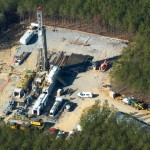From the Casper Star-Tribune
Federal workers for the Bureau of Land Management approved 73 oil and gas drilling permits in Wyoming during the 35-day government shutdown earlier this year, according to a public records request submitted by a western environmental group.
A partial shutdown shuttered some federal agencies in late December as Congress and President Donald Trump bickered over the White House’s desire to fund a $5 billion wall along the country’s southern border with Mexico. An estimated 800,000 workers were affected, with many banned from work until Congress agreed on funding that reopened the government. It was the longest shutdown in U.S. history.
But about half way through the partial shutdown, some Bureau of Land Management workers were brought back to work in some western field offices in order to process permit applications from oil and gas companies, in particular the Carlsbad field office in New Mexico, which processes permit applications for part of the Permian Basin, most of which is in West Texas.
A limited return of Wyoming employees to address state drilling permit applications as well as sundries – approvals needed when oil and gas firms want to make adjustments to approved drilling plants – began on Jan. 14, according to the Bureau of Land Management. Industry had pushed for some allowances for its operations to continue, arguing that the shutdown was hobbling its activities, from drilling permit approvals to the more mundane daily operations that require BLM oversight on public lands.
The Center for Western Priorities, which received the application for permit-to-drill data via a researcher affiliated with the group, said Wyoming’s approved permit applications likely account for about one quarter of those approved during the shutdown.
The group had sought records regarding to the shutdown to unveil what activities were prioritized during the partial government closure given that public parks were left open but unstaffed, said Jesse Prentice-Dunn, policy director Center for Western Priorities.
Prentice-Dunn said the allowance of the oil and gas bureaucracy to continue during the shutdown is reflective of the energy approach for BLM under Acting Interior Secretary David Bernhardt, a former energy lobbyist who shepherded controversial changes to sage grouse management plans in Wyoming as deputy interior secretary.
“It speaks volumes that he sent folks back to work during the shutdown, specifically to process drilling permits,” Prentice-Dunn said. “That has nothing to do with maintaining the safety of drilling operations; it’s simply to speed along more drilling applications.”
Environmental groups have become increasingly critical of Bernhardt since Interior Secretary Ryan Zinke stepped down in early January, and it appeared likely that the acting secretary would take Zinke’s place.
Bernhardt is from a small town in Western Colorado and spent part of his childhood at his grandparents’ ranch in southwest Wyoming, according to his recent testimony during his confirmation hearing before Congress. The acting secretary noted the multiple use of western lands — of agriculture, outdoor recreation and energy during the speech.
Bernhardt has been a behind-the-scenes voice in crucial Wyoming management decisions under the Trump administration. He was in contact with Gov. Matt Mead’s office during the Interior’s work to revise sage grouse management plans and has made quiet trips to visit local officials in the state.
The Interior department was not immediately available for comment on this story.







